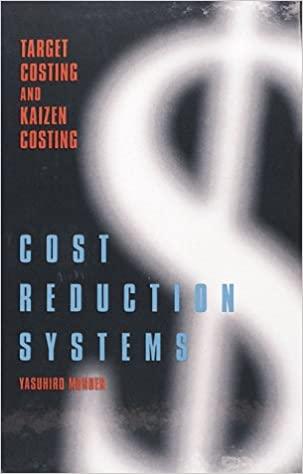Question
Real-world companies often seek to reduce the complexity of their operations in an attempt to increase profits. In 2012, Procter & Gamble (P&G) believed it
Real-world companies often seek to reduce the complexity of their operations in an attempt to increase profits. In 2012, Procter & Gamble (P&G) believed it could increase the company's profits by eliminating some product-lines. In 2017, P&G announced that it had "divested, discontinued, or consolidated 105 brands". As a result, even though its sales had decreased by 22 percent from 2012 to 2017, its profit as a percentage of sales had increased by 55 percent. Other companies have also tried to improve their financial performance by downsizing. In November 2017, General Electric announced it would begin a downsizing operation that would result in their exiting business using over $20 billion in assets in the next one to two years. In January 2018, Newell Brands, the company whose products include Tupperware, Sharpie pens, Elmer's Glue, and Rawlings sports products, announced it would be reducing its product offerings to the extent that it would close half of its facilities and reduce it revenues by 20 percent.
Required
- Identify some cost savings these companies might realize by reducing the number of items they sell or use in production. Be as specific as possible and use your imagination.
- Consider the additional information presented as follows, which is hypothetical. All dollar amounts are in thousands; unit amounts are not. Assume that P&G decides to eliminate one shampoo line, Luster, for one of its segments that currently produces three products. As a result, the following are expected to occur.
-
(1) The number of units sold for the segment is expected to drop by only 125,000 because of the elimination of Luster, since most customers are expected to purchase an Anagen or Catagen product instead. The shift of sales from Luster to Anagen and Catagen is expected to be evenly split. In other words, the sales of Anagen and Catagen will each increase by 50,000 units.
(2) Rent is paid for the entire production facility, and the space used by Luster cannot be sublet.
(3) Utilities costs are expected to be reduced by $40,000.
(4) All of the supervisors for Luster were terminated. No new supervisors will be hired for Anagen or Catagen.
(5) Half of the equipment being used to produce Luster is also used to produce the other two products and its depreciation cost must be absorbed by them. The remaining equipment has a book-value of $340,000 and can be sold for only $60,000.
(6) Facility-level costs will continue to be allocated between the product lines based on the number of units produced.
Prepare revised product-line earnings statements based on the elimination of Luster. (Hint: It will be necessary to calculate some per-unit data to accomplish this).
Product-Line Earnings Statements
(Dollar amounts are in thousands)
Annual Costs of Operating Each Product Line
Anagen
Catagen
Luster
Total
Sales in units
450,000
450,000
225,000
1,125,000
Sales in dollars
900,000
900,000
450,000
2,250,000
Unit-level costs:
Cost of production
85,500
85,500
46,200
217,200
Sales commissions
11,700
11,700
6,000
29,400
Shipping and handling
20,250
18,000
9,000
47,250
Miscellaneous
6,750
4,500
2,250
13,500
Total unit-level costs
124,200
119,700
63,450
307,350
Product-level costs:
Supervisors salaries
9,600
7,200
2,400
19,200
Facility-level costs:
Rent
100,000
100,000
50,000
250,000
Utilities
112,500
112,500
56,250
281,250
Depreciation on equipment
400,000
400,000
200,000
1,000,000
Allocated companywide expenses
22,500
22,500
11,250
56,250
Total facility-level costs
635,000
635,000
317,500
1,587,500
Total product cost
768,800
761,900
383,350
1,914,050
Profit on products
$131,200
$138,100
$66,650
$335,950
Step by Step Solution
There are 3 Steps involved in it
Step: 1

Get Instant Access to Expert-Tailored Solutions
See step-by-step solutions with expert insights and AI powered tools for academic success
Step: 2

Step: 3

Ace Your Homework with AI
Get the answers you need in no time with our AI-driven, step-by-step assistance
Get Started


